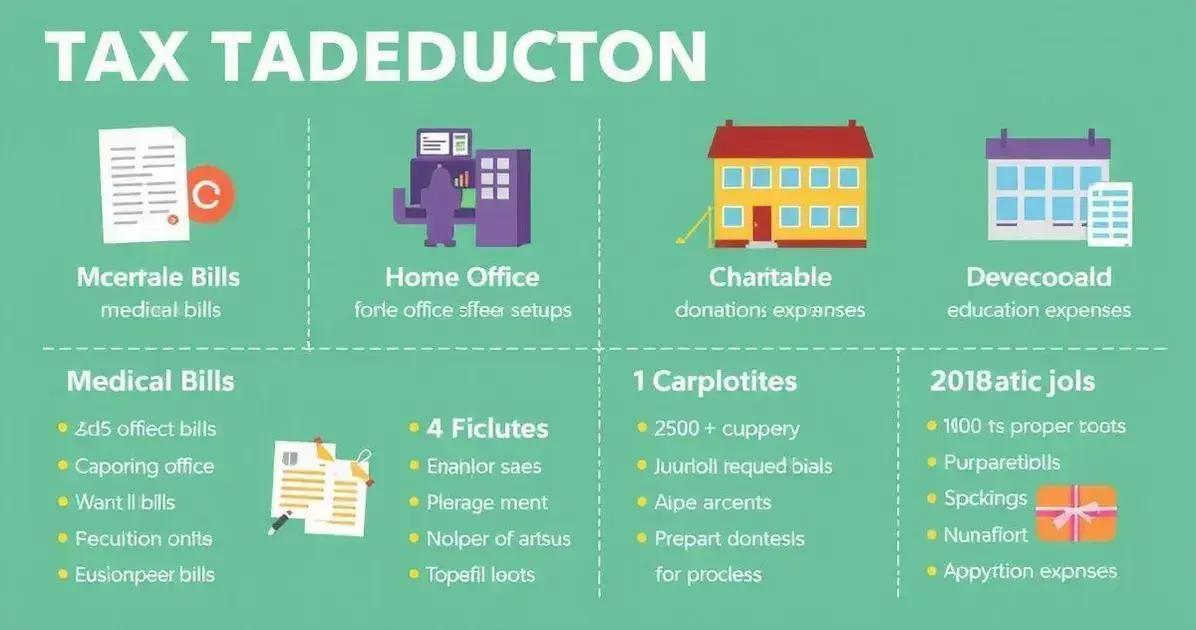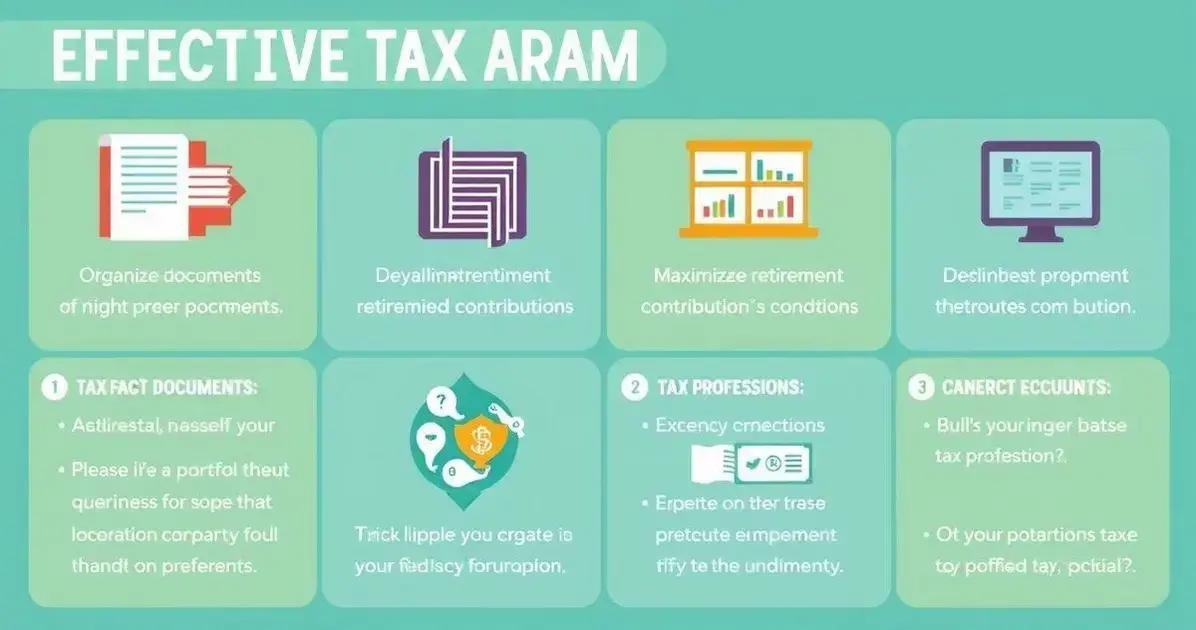Taxes: Uncovering Secrets You Didn’t Know About Your Tax Responsibilities
Advertising
Understanding taxes involves recognizing different types, maximizing deductions, and adapting to changes in tax laws. Efficient tax planning ensures that you minimize liabilities and take full advantage of available credits, ultimately leading to better financial health. Staying informed and organized is key to managing your tax responsibilities.
Are you confused about your taxes? You’re not alone! The world of taxation can be overwhelming, with rules and deductions that often change. In this post, we’ll simplify the complexities of taxes, helping you understand your responsibilities while offering tips to maximize your returns.
Understanding the Basics of Taxes
Understanding taxes starts with knowing the different types that exist. The most common types are income tax, sales tax, and property tax. Each plays a vital role in funding government services, from schools to roads and healthcare.
Types of Taxes
1. Income Tax: This tax is levied on the earnings of individuals and businesses. Most people pay this tax through payroll deductions or when they file their tax returns. It’s important to know your tax bracket to understand how much you owe.
2. Sales Tax: This is charged on the sale of goods and services. It varies by state, and some items may be exempt from sales tax. Knowing what items you purchase that are taxable can help you budget better.
3. Property Tax: If you own a home, you likely pay property taxes to your local government. This tax is based on your property’s value. Understanding how it is assessed can help you manage your finances more effectively.
Why Taxes Matter
Taxes are critical for funding public services. Without them, vital services such as education, public safety, and infrastructure would suffer. Realizing the impact of taxes on your community helps underscore their importance.
Filing Taxes
Each year, individuals must file a tax return to report their earnings and calculate how much they owe. It’s essential to maintain accurate records of your income and expenses throughout the year. This makes the filing process easier and may help you identify deductions.
Understanding Tax Deductions and Credits
Tax deductions lower your taxable income, while tax credits reduce the tax you owe dollar for dollar. Knowing the difference can save you money. Common deductions include mortgage interest and medical expenses. Familiarize yourself with available credits, such as the Earned Income Tax Credit (EITC), to maximize your savings.
Common Tax Deductions You May Miss

Tax deductions can significantly reduce your tax bill and help you keep more of your hard-earned money. Unfortunately, many people overlook important deductions that can be beneficial. Here are some common tax deductions you may miss.
1. Medical Expenses
Did you know that you can deduct medical expenses? If your unreimbursed medical costs exceed 7.5% of your adjusted gross income (AGI), you can claim those expenses. This includes hospital stays, prescription medications, and even mileage for medical appointments.
2. State and Local Taxes
You can deduct certain state and local taxes you’ve paid during the year, which can help reduce your taxable income. This includes property taxes and either state income tax or sales tax. Be sure to keep good records of these payments!
3. Home Office Deduction
If you work from home, you might qualify for a home office deduction. You can deduct a portion of your home expenses, like rent, mortgage interest, and utilities, based on the size of your home office compared to your total living space.
4. Charitable Contributions
Donating to charity can benefit those in need, and it can also help your tax situation. You can deduct cash donations or the fair market value of donated items, like clothes or furniture. Remember to keep track of your donations with receipts.
5. Education Expenses
If you’re investing in your education or that of your spouse or children, certain education expenses may qualify for deductions. This includes student loan interest and tuition fees, potentially reducing how much tax you’ll owe.
By being aware of these common deductions, you can save money on your taxes. Keeping good records and understanding what you’re eligible for can help maximize your savings!
How Tax Changes Impact Your Finances
Changes in tax laws can significantly influence your finances. Understanding these alterations is crucial for effective financial planning. Here’s how various tax changes can impact your money.
1. Adjustments to Tax Rates
When tax rates increase, you may owe more on your taxable income. This means less money in your pocket at the end of the year. Conversely, if rates decrease, you could keep more of your earnings, allowing for better budgeting and spending.
2. New Deductions and Credits
Sometimes, tax changes introduce new deductions or credits. These can lower your taxable income or directly reduce your tax owed. Staying informed about these updates can maximize savings, helping you allocate funds toward other expenses or investments.
3. Changes to Retirement Savings
If tax rules about retirement accounts change, it can affect how you save for the future. Contribution limits might raise or lower, and tax-free withdrawals could vary. Staying on top of these regulations ensures you are making the most of your retirement savings.
4. Impact on Investment Income
Tax changes can also affect how much you pay on investment income. If capital gains taxes increase, it could reduce your profits when selling investments. Understanding these implications helps you make informed decisions about buying and selling.
5. Economic Conditions
Tax changes often follow economic shifts. A stronger economy might lead to reductions in government programs allowing for lower taxes overall. Alternatively, an economic downturn could bring higher taxes to support revenue needs. Being aware of these connections assists in effective financial planning.
By keeping track of how tax changes affect various aspects of your finances, you can better prepare and adapt your financial strategies.
Tips for Efficient Tax Planning

Efficient tax planning can help you minimize your tax bill and strategically allocate your resources. Here are some valuable tips to guide you:
1. Start Early
The earlier you begin your tax planning, the better. Start by organizing your financial documents and understanding your tax situation months before the tax deadline. This allows you to make informed decisions and take advantage of opportunities.
2. Keep Detailed Records
Maintain accurate records of all income and expenses throughout the year. This includes receipts for deductions and credits you plan to claim. Having this information readily available can simplify filing and ensure you don’t miss any deductions.
3. Maximize Retirement Contributions
Contributing to retirement accounts not only prepares you for the future but also can help lower your taxable income. Explore options like 401(k)s and IRAs. Contributions may be tax-deductible, so make the most of these accounts.
4. Stay Informed About Tax Laws
Tax laws frequently change, so it’s important to keep informed about any new laws that may affect your taxes. This knowledge will allow you to adapt your planning strategies and ensure compliance while maximizing your savings.
5. Consult a Tax Professional
If you’re unsure about how to plan your taxes efficiently, consider consulting a tax professional. They can provide personalized advice tailored to your situation, ensuring that you take full advantage of available deductions and credits.
By following these tips for efficient tax planning, you can navigate your tax responsibilities with confidence and potentially increase your tax savings.
Understanding Your Tax Responsibilities Can Empower You
By uncovering the secrets behind taxes, you can navigate your financial responsibilities with greater ease. From understanding the basics of taxes to knowing common deductions you might miss, each aspect contributes to a stronger financial future.
Tax changes impact your finances in various ways, emphasizing the need for strategic planning. Implementing efficient tax planning techniques will help you maximize your deductions and minimize your tax liabilities.
Stay informed, take action early, and consider professional guidance when necessary. With these tools in your arsenal, you can confidently take charge of your taxes and enhance your overall financial health.
FAQ – Frequently Asked Questions about Taxes
What are the most common types of taxes I should be aware of?
The most common types of taxes include income tax, sales tax, and property tax. Each has different implications for your finances.
How can I find out about deductions I might qualify for?
Consult IRS guidelines, browse tax preparation websites, or work with a tax professional to discover deductions specific to your situation.
Why is it important to start tax planning early?
Starting early allows you to organize your documents and make informed decisions that can optimize your tax savings.
What should I do if I made a mistake on my tax return?
If you made a mistake, you can file an amended return with the correct information. It’s important to fix errors to avoid potential penalties.
How often do tax laws change, and how can I stay updated?
Tax laws can change frequently. Stay updated by reading IRS announcements, subscribing to tax-related newsletters, or following trusted financial news sources.
What documents should I keep for tax filing?
Keep records of income, receipts for expenses, bank statements, and any documents related to deductions and credits you intend to claim.




